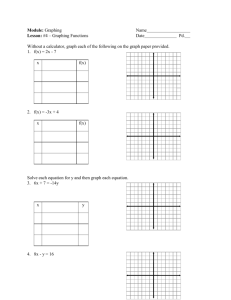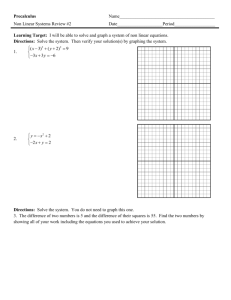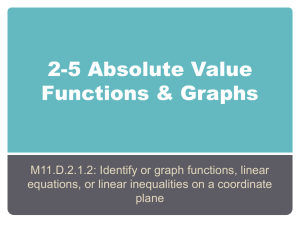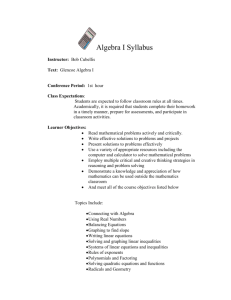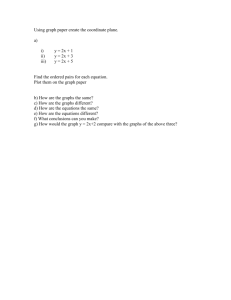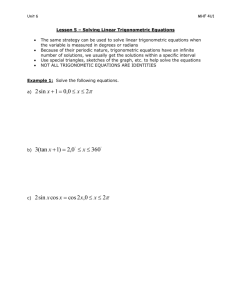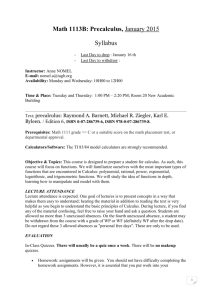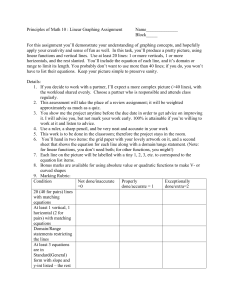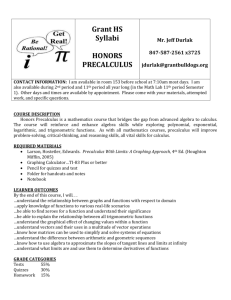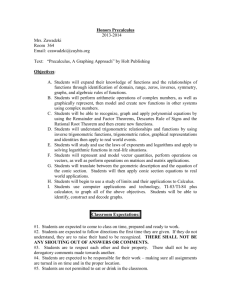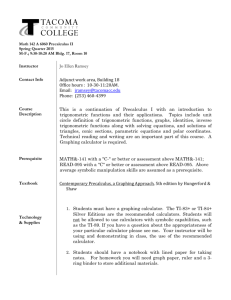DeVry Institute of Technology
advertisement
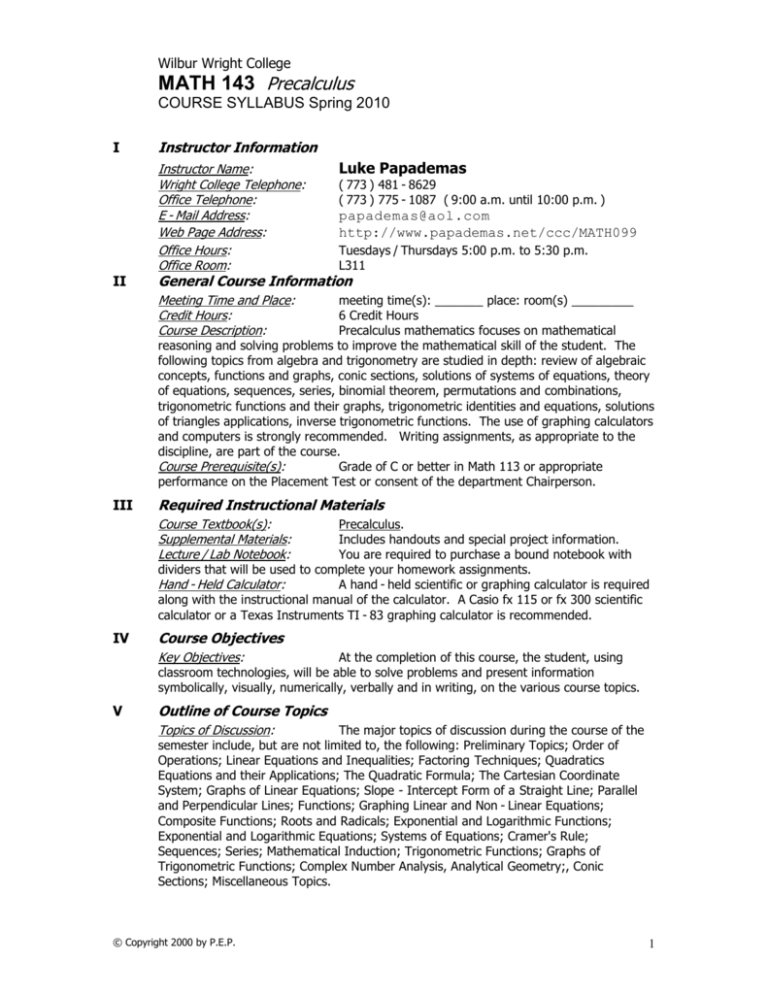
Wilbur Wright College MATH 143 Precalculus COURSE SYLLABUS Spring 2010 I II Instructor Information Instructor Name: Wright College Telephone: Office Telephone: E - Mail Address: Web Page Address: Office Hours: Office Room: Luke Papademas ( 773 ) 481 - 8629 ( 773 ) 775 - 1087 ( 9:00 a.m. until 10:00 p.m. ) papademas@aol.com http://www.papademas.net/ccc/MATH099 Tuesdays / Thursdays 5:00 p.m. to 5:30 p.m. L311 General Course Information Meeting Time and Place: Credit Hours: Course Description: meeting time(s): _______ place: room(s) _________ 6 Credit Hours Precalculus mathematics focuses on mathematical reasoning and solving problems to improve the mathematical skill of the student. The following topics from algebra and trigonometry are studied in depth: review of algebraic concepts, functions and graphs, conic sections, solutions of systems of equations, theory of equations, sequences, series, binomial theorem, permutations and combinations, trigonometric functions and their graphs, trigonometric identities and equations, solutions of triangles applications, inverse trigonometric functions. The use of graphing calculators and computers is strongly recommended. Writing assignments, as appropriate to the discipline, are part of the course. Course Prerequisite(s): Grade of C or better in Math 113 or appropriate performance on the Placement Test or consent of the department Chairperson. III Required Instructional Materials Course Textbook(s): Supplemental Materials: Lecture / Lab Notebook: Precalculus. Includes handouts and special project information. You are required to purchase a bound notebook with dividers that will be used to complete your homework assignments. Hand - Held Calculator: A hand - held scientific or graphing calculator is required along with the instructional manual of the calculator. A Casio fx 115 or fx 300 scientific calculator or a Texas Instruments TI - 83 graphing calculator is recommended. IV Course Objectives Key Objectives: At the completion of this course, the student, using classroom technologies, will be able to solve problems and present information symbolically, visually, numerically, verbally and in writing, on the various course topics. V Outline of Course Topics Topics of Discussion: The major topics of discussion during the course of the semester include, but are not limited to, the following: Preliminary Topics; Order of Operations; Linear Equations and Inequalities; Factoring Techniques; Quadratics Equations and their Applications; The Quadratic Formula; The Cartesian Coordinate System; Graphs of Linear Equations; Slope - Intercept Form of a Straight Line; Parallel and Perpendicular Lines; Functions; Graphing Linear and Non - Linear Equations; Composite Functions; Roots and Radicals; Exponential and Logarithmic Functions; Exponential and Logarithmic Equations; Systems of Equations; Cramer's Rule; Sequences; Series; Mathematical Induction; Trigonometric Functions; Graphs of Trigonometric Functions; Complex Number Analysis, Analytical Geometry;, Conic Sections; Miscellaneous Topics. © Copyright 2000 by P.E.P. 1 Wilbur Wright College MATH 143 Precalculus COURSE SYLLABUS Spring 2010 VI Methods of Evaluating Student Progress Grading Scale: Grading will use the scale: 100 to 90 is an A, 89 to 80 is a B, 79 to 70 is a C, 69 to 60 is a D and 59 to 0 is an F. Grade Determination: Your final course grade will be based on the following: Homework 15%, Quizzes 10%, Four In - Class Exams 25%, In - Class and Self Study Exercises 10%, Individual Projects 10%, Lecture / Lab Notebook 5%, Final Exam 25%. Grade Breakdown: Homework Assignments are issued on a weekly basis and must be submitted prior to or exactly on the due dates. Quizzes usually are announced in advance, however, " pop " quizzes may be given. There are no make - ups for any missed quizzes. In - Class Exams are typically closed book and closed notes. There are no individual make - ups for any of the in - class exams. Instead, a comprehensive make - up exam ( 85 maximum points ) will be given during week 13. In - Class Exercises are usually completed during part of the lecture session. Self Study Exercises are issued to have students discover some course topics on their own. Individual Projects are to be unique, original and submitted in a professionally prepared presentation binder. Students are required to maintain a Lecture / Lab Notebook consisting of both lecture and lab work. The Final Exam is cumulative and closed book. VII Methods of Instruction Instruction Techniques: The methods used to instruct the course material may include: (1) Lecture-oral presentation, (2) Class discussion, (3) Individual and group projects and (4) Discovery or the Socratic method of asking questions. VIII Course Practices Required Student Practices: Students enrolled in this class should (1) attend class regularly, (2) complete assignments on time and (3) demonstrate assigned problems. IX Academic Integrity Integrity Policy: The nature of higher education requires that students adhere to accepted standards of academic integrity as listed in the student handbook. X Other Course Information Additional Items of Note: (a) You are responsible for any classes that you miss. Have telephone numbers of others in the class, get assignments, notes, deadlines etc. from them. (b) Changes to this syllabus may be made when deemed appropriate and without notice. (c) Tutors are available by appointment in room A245 . XI Academic Etiquette Classroom Behavior: Some guidelines are: (1) come to class prepared, (2) be courteous, and treat one another and your professor with respect, (3) pay careful attention to the lecture and (4) follow any instructions promptly. XII Attendance Policy Attendance Policy: The campus attendance policy will be followed. Refer to the student handbook for more information. XIII Instructor's Comments A few words: © Copyright 2000 by P.E.P. Welcome to the course. I wish everyone good success! 2
